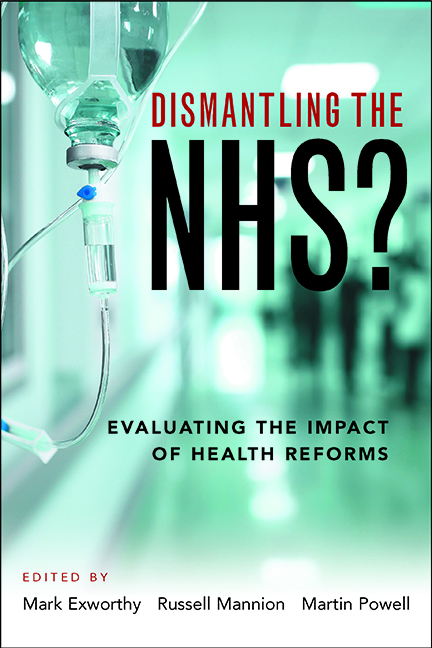ten - Public health: unchained or shackled?
Published online by Cambridge University Press: 05 April 2022
Summary
Introduction
As in the case of other parts of the UK wider health system, it has been a turbulent time for public health since 2010. Not only has the function undergone major structural and cultural change following its return to local government from the NHS, where it had been located since 1974, but it has had to confront new challenges in public health arising from lifestyle behaviours and a widening health gap between social groups. All of this has occurred during a period of unprecedented financial austerity affecting public services in general but local government in particular. This chapter reviews the state of public health in the lead up to the changes announced by the Coalition government in 2010. It then summarises the reforms before offering an interim assessment of their impact. Finally, it discusses the evidence to date concerning the reforms and speculates on likely prospects in the years ahead.
State of public health prior to 2010
Up until the passage of the Health and Social Care Act 2012, responsibility for public health in England lay with the NHS and in particular, at local level, with Primary Care Trusts (PCTs). Under the auspices of World Class Commissioning (WCC), introduced in 2007 to develop commissioning, PCTs’ principal tasks included assessing the health needs of their communities and providing for them in regard to preventive and health care services. The purchaser– provider split was first introduced in 1991 with the aim of ensuring that purchasers assessed needs and provided for these in the most cost-effective way possible. From the outset, however, the real power continued to lie with the providers, and purchasing, or commissioning as it subsequently became known, largely failed to demonstrate its value. The WCC was a further attempt to revitalise the function.
For the most part, however, and despite WCC, public health remained a Cinderella sector within the NHS as, indeed, it had always tended to be since its transfer to the NHS from local government control in 1974. Spending on public health accounted for no more than 4% of the total health care budget. And even when budgets for public health had been agreed by PCTs, they were subject to frequent raids in order to maintain funding on acute care services or to fill gaps in spending on hospitals and beds.
- Type
- Chapter
- Information
- Dismantling the NHS?Evaluating the Impact of Health Reforms, pp. 191 - 210Publisher: Bristol University PressPrint publication year: 2016



